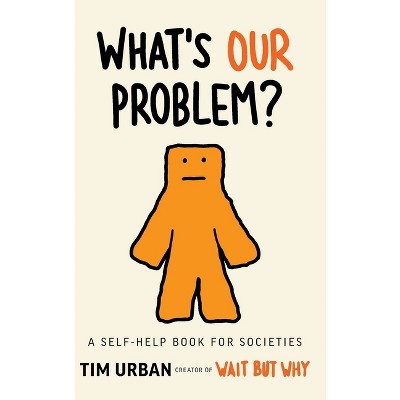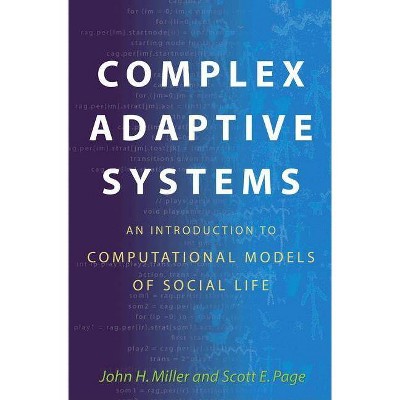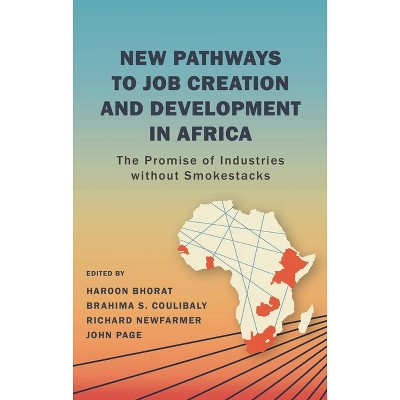Sponsored

Growing Artificial Societies - (Complex Adaptive Systems) by Joshua M Epstein & Robert L Axtell (Paperback)
New at target
$33.49Save $1.51 (4% off)
In Stock
Eligible for registries and wish lists
Sponsored
About this item
Highlights
- "A Brookings Institution Press and MIT Press publication How do social structures and group behaviors arise from the interaction of individuals?
- About the Author: Robert L. Axtell was formerly research associate in the Brookings Foreign Policy Studies program.
- 226 Pages
- Social Science, Sociology
- Series Name: Complex Adaptive Systems
Description
About the Book
"A Brookings Institution Press and MIT Press publication How do social structures and group behaviors arise from the interaction of individuals? In this groundbreaking study, Joshua M. Epstein and Robert L. Axtell approach this age-old question with...Book Synopsis
"A Brookings Institution Press and MIT Press publication How do social structures and group behaviors arise from the interaction of individuals? In this groundbreaking study, Joshua M. Epstein and Robert L. Axtell approach this age-old question with cutting-edge computer simulation techniques. Such fundamental collective behaviors as group formation, cultural transmission, combat, and trade are seen to ""emerge"" from the interaction of individual agents following simple local rules. In their computer model, Epstein and Axtell begin the development of a ""bottom up"" social science. Their program, named Sugarscape, simulates the behavior of artificial people (agents) located on a landscape of a generalized resource (sugar). Agents are born onto the Sugarscape with a vision, a metabolism, a speed, and other genetic attributes. Their movement is governed by a simple local rule: ""look around as far as you can; find the spot with the most sugar; go there and eat the sugar."" Every time an agent moves, it burns sugar at an amount equal to its metabolic rate. Agents die if and when they burn up all their sugar. A remarkable range of social phenomena emerge. For example, when seasons are introduced, migration and hibernation can be observed. Agents are accumulating sugar at all times, so there is always a distribution of wealth. Next, Epstein and Axtell attempt to grow a ""proto-history"" of civilization. It starts with agents scattered about a twin-peaked landscape; over time, there is self-organization into spatially segregated and culturally distinct ""tribes"" centered on the peaks of the Sugarscape. Population growth forces each tribe to disperse into the sugar lowlands between the mountains. There, the two tribes interact, engaging in combat and competing for cultural dominance, to produce complex social histories with violent expansionist phases, peaceful periods, and so on. The proto-history combines a number of ingredients, each of which generates insights of its own. One of these ingredients is sexual reproduction. In some runs, the population becomes thin, birth rates fall, and the population can crash. Alternatively, the agents may over-populate their environment, driving it into ecological collapse. When Epstein and Axtell introduce a second resource (spice) to the Sugarscape and allow the agents to trade, an economic market emerges. The introduction of pollution resulting from resource-mining permits the study of economic markets in the presence of environmental factors. This study is part of the 2050 Project, a joint venture of the Santa Fe Institute, the World Resources Institute, and the Brookings Institution. The project is an international effort to identify conditions for a sustainable global system in the middle of the next century and to design policy actions to help achieve such a system."From the Back Cover
Growing Artificial Societies is a milestone in social science research. It vividly demonstrates the potential of agent-based computer simulation to break disciplinary boundaries. It does this by analyzing in a unified framework the dynamic interactions of such diverse activities as trade, combat, mating, culture, and disease. It is an impressive achievement.'Review Quotes
""Growing Artificial Societies" is a milestone in social science research. It vividly demonstrates the potential of agent-based computer simulation to break disciplinary boundaries. It does this by analyzing in a unified framework the dynamic interactions of such diverse activities as trade, combat, mating, culture, and disease. It is an impressive achievement."--Robert Axelrod, University of Michigan
"
" Growing Artificial Societies is a milestone in social science research. It vividly demonstrates the potential of agent-based computer simulation to break disciplinary boundaries. It does this by analyzing in a unified framework the dynamic interactions of such diverse activities as trade, combat, mating, culture, and disease. It is an impressive achievement." -- Robert Axelrod, University of Michigan
" "Growing Artificial Societies" is a milestone in social science research. It vividly demonstrates the potential of agent-based computer simulation to break disciplinary boundaries. It does this by analyzing in a unified framework the dynamic interactions of such diverse activities as trade, combat, mating, culture, and disease. It is an impressive achievement." -- Robert Axelrod, University of Michigan
-- Robert Axelrod, University of Michigan
About the Author
Robert L. Axtell was formerly research associate in the Brookings Foreign Policy Studies program.
Dimensions (Overall): 8.98 Inches (H) x 6.13 Inches (W) x .47 Inches (D)
Weight: .9 Pounds
Suggested Age: 22 Years and Up
Number of Pages: 226
Genre: Social Science
Sub-Genre: Sociology
Series Title: Complex Adaptive Systems
Publisher: Brookings Institution Press
Theme: Urban
Format: Paperback
Author: Joshua M Epstein & Robert L Axtell
Language: English
Street Date: October 1, 1996
TCIN: 1004109292
UPC: 9780262550253
Item Number (DPCI): 247-20-8785
Origin: Made in the USA or Imported
If the item details aren’t accurate or complete, we want to know about it.
Shipping details
Estimated ship dimensions: 0.47 inches length x 6.13 inches width x 8.98 inches height
Estimated ship weight: 0.9 pounds
We regret that this item cannot be shipped to PO Boxes.
This item cannot be shipped to the following locations: American Samoa (see also separate entry under AS), Guam (see also separate entry under GU), Northern Mariana Islands, Puerto Rico (see also separate entry under PR), United States Minor Outlying Islands, Virgin Islands, U.S., APO/FPO
Return details
This item can be returned to any Target store or Target.com.
This item must be returned within 90 days of the date it was purchased in store, shipped, delivered by a Shipt shopper, or made ready for pickup.
See the return policy for complete information.












